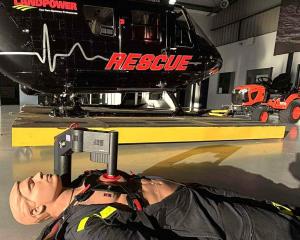For Danielle Pearson, Department of Conservation Wakatipu biodiversity services ranger, Mt Aspiring National Park ''is amazing and mind-blowing, I just don't know how to sum it up''.
However, Ms Pearson and fellow biodiversity ranger Sandra Barnaba do know how to protect the precious biodiversity of the Routeburn and Dart Valleys.
Over the past two years they have been responsible for checking more than 750 predator traps which run along more than 150km of new trap control lines crisscrossing the valleys.
It was essential to have so many traps to catch the stoats and rats which were so devastating for the native birdlife, they said.
Every trap needs to be checked and reset regularly. This means walking the full length of the trap lines at least once a month.
Eggs are used as bait so the rangers carry backpacks full of eggs - they do not want to walk nearly 20km only to break the eggs at the end.
Their work is funded via Air New Zealand's sponsorship of the Routeburn Track, part of the company's Great Walks sponsorship programme.
The aim of the funding is to bring back some of New Zealand's rarest birds to the Great Walks.
The work by Ms Pearson and Ms Barnaba is the first step towards this goal.
The 150km of new trap lines are proving successful and in the first year 110 stoats and 27 rats were caught in the Routeburn area alone.
Through their work, the women get to explore valleys which most people will never see and are often lucky enough to meet the wildlife they are working to protect.
''We visit places where it is truly quiet, so we get to see birds like the whio [blue duck] hanging out in the rivers,'' Ms Barnaba said.
''There are also the days where you get to see a rainbow reaching from one waterfall to the next.''
However, the job is not all sunshine and birdsong - there are some long hard days in the field.
The trap lines the rangers patrol vary in length from 4km to 24km, but are rarely flat, and cleaning up rotten stoat remains from the traps is not too much fun.
''You might be huffing and puffing along then next minute a mohua [yellowhead] lands next to you. You get to see it doing its thing and you know that the hard work is worth it,'' Ms Pearson said.
The rangers said they were passionate about the area they were working to protect.
When asked why they did it, Ms Pearson simply said: ''Because I love it.''
Ms Barnaba said conservation ''doesn't just happen - it's important we don't take our species for granted''.












